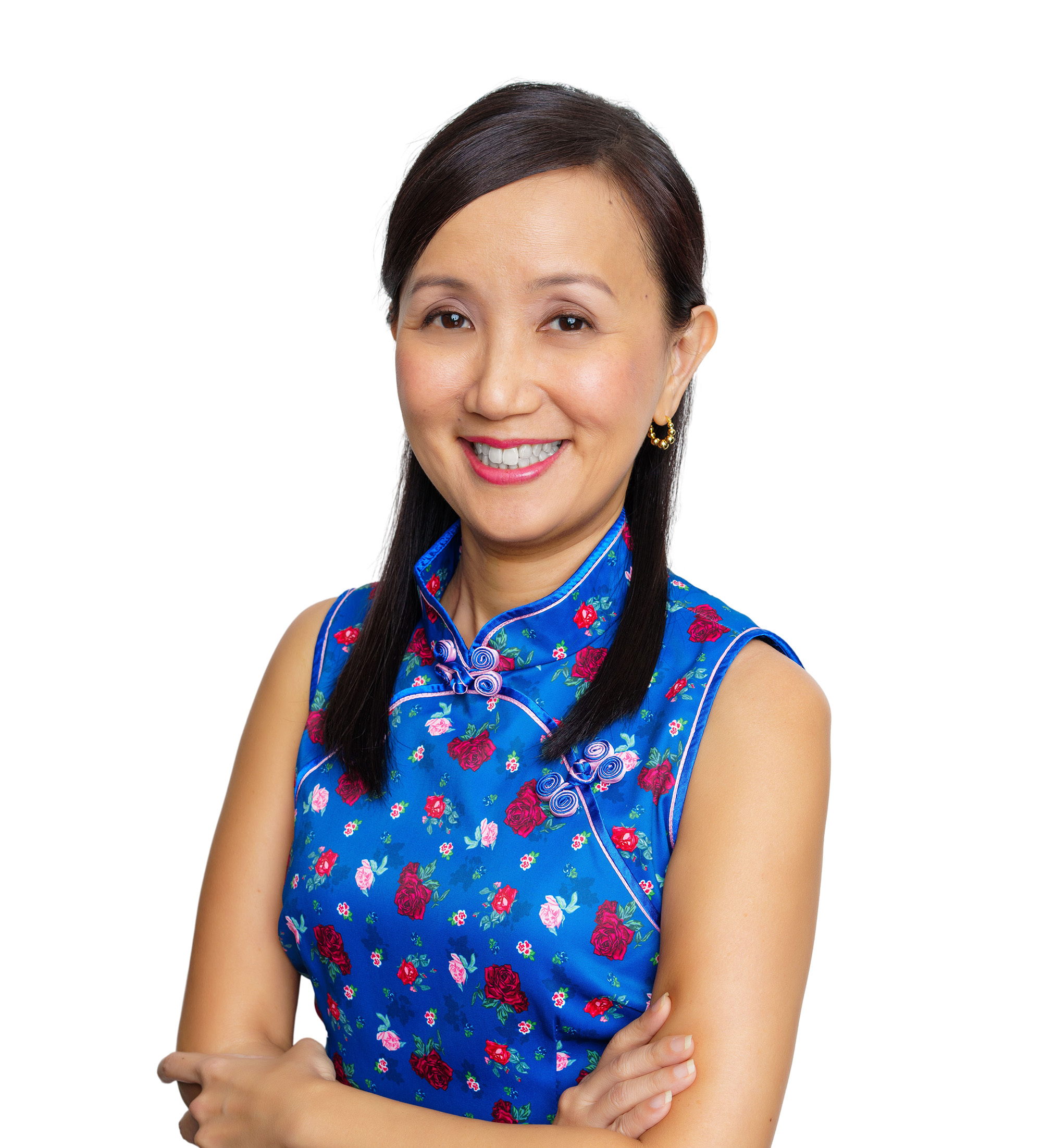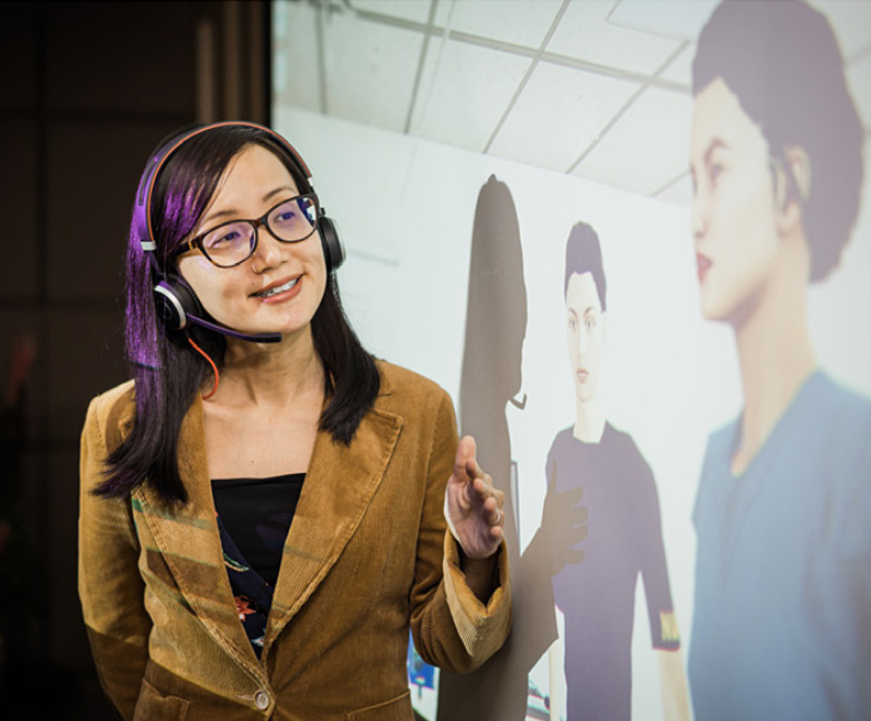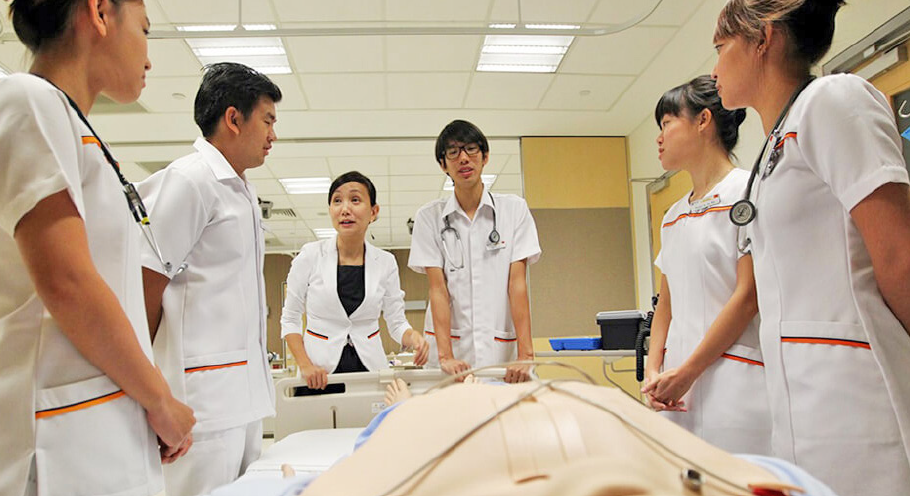News
Connecting the Dots with Prof Liaw
15 July 2024

Nurse. Teacher. Researcher. Leader. Professor Liaw Sok Ying is NUS Nursing’s fifth inductee into the Sigma 2024 International Nurse Researcher Hall of Fame. This recognition couldn’t be more opportune, coinciding with the 35th International Nursing Research Congress happening in Singapore from 25 to 28 July 2024.
Ahead of the award ceremony in July, NUrSing caught up with the Head of Alice Lee Centre for Nursing Studies (NUS Nursing), National University of Singapore Yong Loo Lin School of Medicine to get a glimpse into her multifaceted career thus far.

First brush with research—
“I first encountered researchers when I was still a practising nurse—having the misconception that they were task-oriented focusing on only data collection. But that changed when I joined NUS Nursing as a lecturer. The research culture here was very inspiring. Plus, hearing researchers talk about what they were working on and the freedom they get to explore and experiment with innovations really piqued my curiosity.
“That left the questions—what kind of researcher I want to become and the research areas I want to focus on. It was clear from day one that I would want to do research work that is meaningful, even if the topic is not trendy. Trends come and go but if the work is close to heart, it’s easy to find ways to develop and translate it into positive outcomes.”
Research interests—
“Over the years, my research focus shifts in tandem with causes I am passionate about. But through working closely with research teams, I stay in touch with my earlier research interests—giving new life to them. As a fan of mnemonics, my research focus can be summed up with one word—PRIME. ‘P’ stands for ‘Patient safety and quality of care’, and is the overarching goal for all of my research. Meanwhile, ‘R’, ‘I’, ‘M’ and ‘E’ summarise the different research areas I’ve adopted to achieve that goal.”
Prof Liaw’s Research Pillars Explained
Research Area 1:
Recognising and responding to clinical deterioration
Inspired by her time working as a Registered Nurse in a general ward, Prof Liaw seeks to train nurses to recognise symptoms early ahead of clinical deterioration and escalate care promptly. Prof Liaw said, “This is an important aspect of patient safety because if we left a patient to deteriorate further, this may warrant a resuscitation. They might then have to be sent to the intensive care unit (ICU). The entire process—including dealing with worried family members—can be emotionally stressful.” Prof Liaw’s nursing experience has enabled her to develop training programmes known as RAPIDS (Rescuing A Patient In Deteriorating Situation) to enhance nursing students’ and hospital nurses’ skills in recognising and responding to clinical deterioration.
Research Area 2:
Interprofessional collaboration and education
As important as it is to spot the signs, it is just as important to communicate with the doctors-in-charge effectively. From her research, Prof Liaw saw a gap in communication and teamwork between nurses and doctors, and an opportunity to bridge it through interprofessional education. “Given the logistical challenges we faced in bringing different groups of healthcare students physically together for in-person training, virtual platforms are viable innovative tools for delivering interprofessional education,” Prof Liaw said. She collaborated with an interdisciplinary team to develop a desktop virtual reality simulation known as Create Real-time Experience And Teamwork In Virtual Environment (CREATIVE). Her research also identified suboptimal collaborative practices between Enrolled Nurses and Registered Nurses, which resulted in her interest to develop a Virtual Escape Room Simulation-based Education (VERSE) for intra-professional education.
Research Area 3:
Manpower workforce and development
When Prof Liaw stepped into the role of NUS Nursing Head in July 2023, she also took on the responsibility of aligning growth and training of the Nursing workforce to the needs of Singapore’s ageing population. “As a caregiver for my aged father, I’ve observed first-hand challenges stemming from manpower shortage. To cope with Singapore’s rapidly ageing population, there’s no time to waste. We have to improve the system for recruitment and retention of nurses—fast.” She has been awarded several research grants to support her study on nursing recruitment and competency-based training to strengthen Nursing workforce’s capacity and competency.
Research Area 4:
Experiential learning using simulation
A firm believer of learning by doing, Prof Liaw’s interest in simulations can be traced back to her early years of teaching at NUS Nursing. “I wholly subscribe to simulations—because it’s only when students role-play in an authentic environment that they start to truly reflect and learn. We used to do face-to-face simulation with manikins or standardised patients. But as our cohorts grow steadily, we are increasingly exploring technologies like virtual reality and artificial intelligence (AI) to scale up our programmes. Despite my earlier studies showing the effectiveness of these virtual learning tools, I would not consider them as substitutes for face-to-face simulation learning. Rather, virtual and face-to-face simulations should be combined and integrated so that Nursing students can experience the best of both worlds,” said Prof Liaw. In her simulation programmes such as SIMulated Professional Learning Environment (SIMPLE) and Preceptor Learning Experience At Simulated Environment (PLEASE), a variety of simulation modalities are presented within a blended learning approach.
A memorable research project—
“That has to be Create Real-time Experience And Teamwork In Virtual Environment (CREATIVE). The project recorded many firsts for me. It was my first big grant at half a million dollars (it might not sound impressive now, but it was definitely a big thing to me). In addition, I got to lead an interdisciplinary team comprising members from other NUS schools and departments, as well as the Singapore Institute of Technology and Nanyang Polytechnic.
“It was also my first project that focused on virtual reality (VR) simulation for interprofessional education. We created virtual ward settings and case studies with diverse scenarios so that students from various healthcare disciplines (Nursing, Medicine, Physiotherapy, Occupational Therapy, Pharmacy and Social Work) from different institutions can come together to collaborate. This project was subsequently translated and adapted to facilitate our students’ learning during the pandemic—ensuring minimal training disruption while keeping them safe.”
A proud research achievement—
“As researchers, besides seeking out funding and publication opportunities for our work, we are also always on the lookout for ways and opportunities to either translate our findings into real-world clinical and education settings or inform policies. Occasionally, our efforts get recognised in professional awards. One such pinnacle in my research career was winning the Hayden Vanguard Award for CREATIVE last year, which recognises cutting edge and impactful innovation in healthcare simulation.
“I was the only Asian to be awarded, so it was an immensely gratifying experience to be representing NUS Nursing, our country and the region. Furthermore, as part of the Award, I presented a 1-hour keynote lecture about simulation in healthcare education—a topic close to my heart—to an international audience in the US.”
Recipe for good research outcomes—
“Something I like telling my colleagues and mentees is—’Always follow your heart.’ There’s always something trending—like how AI is ‘in’ right now and everyone is trying to do something related to it. But if you simply chase trends, there is no focus—and your research cannot lead to meaningful outcomes.
“If I may add—following your heart is not limited to the choice of research topics. It also includes building your research work to pursue a sustained line of inquiry (programmatic research) to advance innovation. In my research work, study results are often applied in subsequent studies to achieve iterative advancement.
“Finally, having a good team that can work well together is a must. Research projects these days can be rather complex—so it is quite often that we need to work with researchers from other disciplines, as well as groom young researchers. Knowing one another’s strengths is critical in both instances. For example, our youngest tenured Assistant Professor, Dr Chua Wei Ling, is one of my support pillars for research. She collaborated with me on many projects—and now she’s ready to helm some of her own. I am excited to see her grow.”
From leading research to heading NUS Nursing—
“There are many similarities. The contexts may be different but in both roles, my job is primarily to work with people and empower them. Sometimes, this could be to give them resources to do their job well. Other times, it is to give them opportunities to step up and grow to their full potential. But whatever the case, it is always with the big picture in mind—I’ve learnt from working with various leaders that it is always best to put the interests of the bigger objective above self.
“I’ll have to admit—in the beginning—I thought that being Head of NUS Nursing meant that I have to present myself differently. Be more firm. But now, authenticity guides and grounds me in my dealings with my research team members and Department Directors whether it is to take a personal interest in their growth or deliver the hard truth about shortfalls in performance. I believe when we are sincere about developing and lifting the people we work with, they would reciprocate by putting their best foot forward.
“Thus far, this style is working quite well. I have a very good team of Directors who support me in various aspects—undergrad education, post-grad education, research and so on. Similarly, I know I can count on my research mentees for support when I need it—my challenge sometimes is to get them to learn to let go and fly free (but that is a story for another day).”

What’s next for NUS Nursing—
“We are ambitious and aspire for Nursing to be better recognised and well respected as a profession. One way is through increasing emphasis on interprofessional collaboration and education to make for better communication as well as respect for one another’s profession even before they enter the workforce. This is on track and in progress with the Common Curriculum for Health Professional Education. Then for the nurses who are already in the workforce, we need to develop more Nursing leaders who are confident and can advocate for the profession. Towards this end, we are progressively rolling out more postdoctoral and doctorate courses at NUS Nursing.
“As the first tertiary institution in Singapore to offer an undergraduate Nursing programme for ‘A’ Level holders and polytechnic graduates, having a good ranking is of significance. Hence, we work to enhance NUS Nursing’s visibility in the global Nursing landscape by encouraging our colleagues and research fellows to conduct meaningful research and publish their findings. Winning notable global Nursing research awards like Sigma or Hayden Vanguard Award is helpful too—beyond being personal affirmation, these awards bring glory to NUS Nursing. The hope is that in the not-too-distant-future, NUS Nursing will come to be known as an institution that originates impactful research—and informs policies.”
“Being inducted into the International Nurse Researcher Hall of Fame during a year when the International Nursing Research Congress is held in Singapore is both an honour and an opportunity to increase NUS Nursing’s international visibility. We are grateful for the affirmation of NUS Nursing’s contributions to Nursing research and education.”
– Dr Liaw Sok Ying
Professor, NUS Nursing
Sigma International Nurse Researchers Hall of Fame 2024
A Day in the Life of Prof Liaw
|
Morning: · 6.30am: Wake up · 6.45am: Morning jog · 7.30am: Reflection and meditation · 7:45am: Breakfast (coffee and snack from nearby hawker centre) · 8am to 11am: Deep work on research planning and writing papers |
|
Afternoon: · 11.30pm: Lunch (usually one-on-one with different colleagues for in-depth chats) · 12.30pm: Administrative tasks and meetings · 7pm: End work |
|
Evening: · 7.30pm: Take away dinner · 8pm: Watch Korean dramas · 9pm to 11pm: Check and respond to emails · 11pm: Well-being routine (Hula Hoop exercise & Facial care) while watching news · 12am: Lights out |


